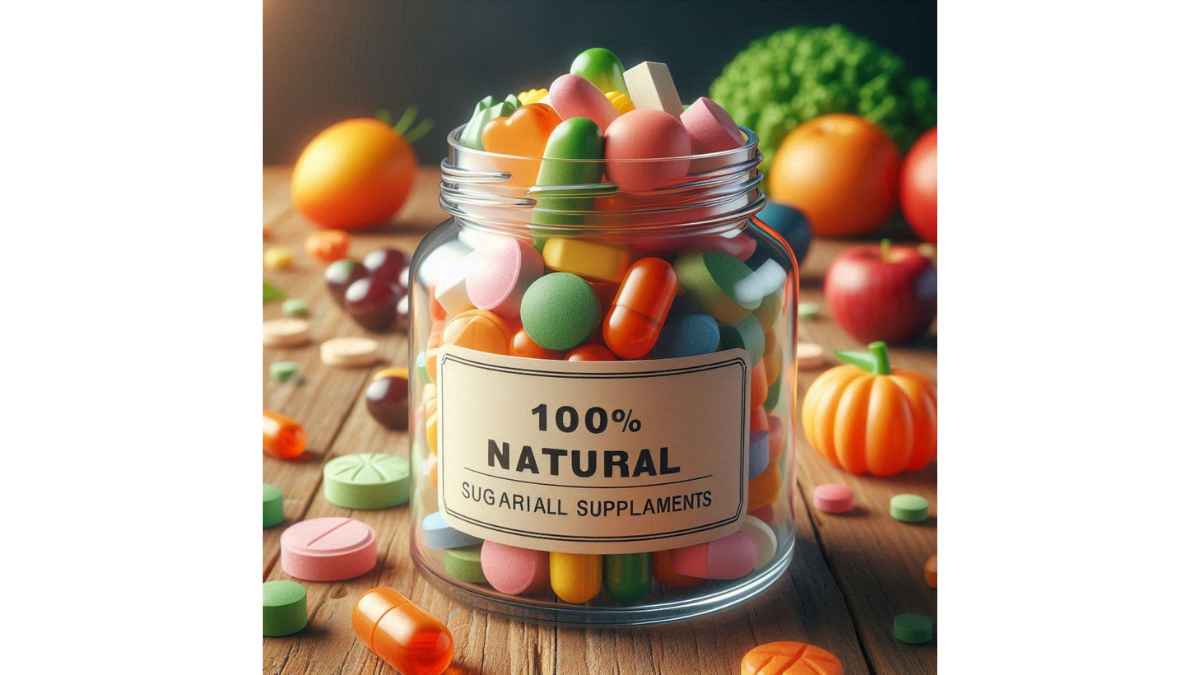Sugar free nutritional supplements

Sugar free nutritional supplements – When exploring the realm of dietary options, you might have stumbled across the term “sugar-free nutritional supplements.” These products have gained significant traction, especially as more people become aware of the implications of sugar on their health. But what exactly are these supplements, and why should you consider incorporating them into your routine?
What are Sugar-Free Nutritional Supplements?
Sugar-free nutritional supplements are formulations designed to provide essential nutrients without the added sugars that can lead to calorie overload and potential health issues. Typically, they come in various forms, including powders, capsules, and or liquids. For instance, if you’re someone who enjoys the benefits of protein shakes, a sugar-free protein powder could provide you with all the protein your body needs without the added sugars that can interfere with your fitness goals. These supplements often contain natural sweeteners or sugar substitutes that give enjoyable flavors without the associated sugar drawbacks. It’s important to note that just because a product is labeled “sugar-free” doesn’t mean it’s entirely devoid of sweetness. Many brands utilize alternative sweetening agents that offer a sweet taste without the sugar load.
Benefits of Sugar-Free Nutritional Supplements
The benefits of sugar-free nutritional supplements go beyond just helping you cut sugar intake. Here’s a look at some significant advantages:
- Calorie Control: Without sugar, these supplements tend to have fewer calories, which is beneficial for weight management. For instance, if you’re replacing a sugary snack with a sugar-free protein bar, you’re not only reducing your sugar intake but also controlling calorie consumption.
- Blood Sugar Regulation: Sugar-free options can protect against spikes in blood sugar levels, making them suitable for individuals managing diabetes or those looking to maintain stable energy levels throughout the day.
- Enhanced Nutritional Value: Many sugar-free supplements are fortified with vitamins, minerals, and other nutrients that can help fill dietary gaps. This ensures that you’re not just eliminating sugar but also boosting your overall nutrient intake.
- Improved Digestion: Some sugar-free supplements incorporate digestive enzymes and fibers that can promote gut health, making it easier for your body to absorb nutrients.
- Variety of Choices: You’ll find a wide variety of sugar-free nutritional products, from protein powders to multivitamins, catering to different dietary needs and preferences. This diversity allows you to easily find options that fit seamlessly into your diet.
To recap, sugar-free nutritional supplements not only help in keeping your sugar levels in check but also pack a considerable punch with all the essential nutrients that can support your overall health and wellness journey. As you continue to explore this exciting realm, it’s time to consider how you can utilize these products to elevate your dietary habits.
Common Ingredients in Sugar-Free Nutritional Supplements
As you dive deeper into the fascinating world of sugar-free nutritional supplements, one of the standout features is the variety of natural sweeteners included. Two common ingredients you’ll often come across are Stevia and Monk Fruit. These sweeteners are not just simply replacements; they play pivotal roles in enhancing flavor while keeping your health goals intact. Let’s explore them in detail.
Stevia
Stevia is a powerful plant-derived sweetener that has taken the health world by storm. Derived from the leaves of the Stevia rebaudiana plant, it is known for being significantly sweeter than sugar with little to no calories. I personally started using Stevia in my morning coffee, and it transformed the way I approached sweetening beverages. Here are some key points about Stevia:
- Natural Origin: Unlike many artificial sweeteners, Stevia is entirely natural. It has been used for centuries by indigenous tribes in South America and is now harvested worldwide.
- Zero Glycemic Index: One of the most appealing aspects of Stevia is that it doesn’t raise your blood sugar levels. For those of you watching your glucose or insulin levels, this is a fantastic attribute.
- Taste Profile: While some people enjoy the taste of Stevia, others describe a slight aftertaste. It’s a good idea to try various forms—like liquid extracts or powder—to find your preferred version.
- Culinary Versatility: Stevia can be used in a variety of recipes, from baked goods to smoothies, making it easier to enjoy sweet flavors without sugar.
Monk Fruit
Monk Fruit, also known as Luo Han Guo, is another exceptional ingredient you’ll often find in sugar-free nutritional supplements. This sweetener comes from the monk fruit plant, native to China, and has been celebrated for its natural sweetness without the calories. Consider these aspects of Monk Fruit:
- Natural Sweetener: Monk Fruit extract is derived from the fruit itself and is considered a “superfood” due to its additional health benefits. It contains powerful antioxidants known as mogrosides.
- Caloric-Free: Similar to Stevia, Monk Fruit has zero calories, making it a guilt-free option for those looking to satisfy their sweet tooth. Just imagine incorporating this into your snacks without worrying about excess calories!
- Health Benefits: Some research suggests that Monk Fruit may have anti-inflammatory properties and help with weight management, making it not just a sweet option but a health-helper as well.
- Unique Flavor: When you try Monk Fruit, you might notice a fruity undertone that sets it apart from other sweeteners. It’s worth experimenting with in recipes, especially in drinks or desserts where a fruity flavor can shine.
In summary, both Stevia and Monk Fruit not only enhance the flavor of sugar-free nutritional supplements but also bring unique health benefits to the table. By incorporating these natural sweeteners into your diet, you’re making choices that can support your health while still enjoying delicious flavors. As you continue your journey with sugar-free supplements, consider how these ingredients can work for you!
Types of Sugar-Free Nutritional Supplements
Now that you’re familiar with common ingredients like Stevia and Monk Fruit, it’s essential to explore the various types of sugar-free nutritional supplements currently available. Each type serves different health needs and can complement your dietary lifestyle effectively. Let’s dive into two popular categories: Protein Powders and Multivitamins.
Protein Powders
Protein powders are a growing staple in the fitness and wellness communities, and sugar-free options are increasingly favored by health-conscious individuals. Whether you’re an athlete, a casual gym-goer, or someone simply focused on nutritional intake, a sugar-free protein powder can be a game-changer. Here’s why protein powders are so beneficial:
- Muscle Recovery: After a workout, replenishing your muscles with protein is crucial. Sugar-free protein powders provide the necessary amino acids without any added sugars, ensuring that your post-exercise routine helps in recovery without compromising your health.
- Weight Management: Many people find that protein can help with satiety – you feel fuller for longer. Replacing high-sugar snacks with a sugar-free protein shake can assist you in managing your weight effectively, keeping cravings at bay.
- Variety of Types: From whey and plant-based proteins like pea and hemp to collagen, there are numerous options available. Experimenting with different types can help you discover what works best for your taste and dietary needs. I’ve personally tried various plant-based protein powders, and some blend beautifully in smoothies without any chalky aftertaste.
- Easy to Incorporate: Whether added to smoothies, oatmeal, or even baked goods, sugar-free protein powders are versatile. You can personalize your intake to fit your daily routine.
Multivitamins
Multivitamins are another critical category of sugar-free nutritional supplements, supporting a balanced diet by filling nutritional gaps. With so many of us juggling busy lives, it can be challenging to get all the nutrients we need from food alone. Here are some reasons to consider incorporating sugar-free multivitamins into your daily regimen:
- Comprehensive Nutrient Coverage: Sugar-free multivitamins often contain a blend of essential vitamins and minerals that promote overall health. This includes vitamin D for bone health, B vitamins for energy production, and antioxidants that support immune function.
- Customization: Many sugar-free multivitamins are tailored to specific dietary needs or lifestyles. For instance, there are options for vegetarians, seniors, and even those focusing on weight management—meaning there’s likely a fit for everyone.
- Digestive Health: Certain formulations include additional ingredients like probiotics or digestive enzymes, enhancing gut health along with providing vital nutrients.
- Convenience: Taking a multivitamin is a simple, effective way to bolster your health without needing to track every single nutrient you consume throughout the day. In my experience, having a sugar-free multivitamin at breakfast made it easy to ensure I started my day on the right foot.
In conclusion, both protein powders and multivitamins play essential roles in the spectrum of sugar-free nutritional supplements. By choosing the right products and incorporating them into your lifestyle, you can achieve your health goals without compromising on flavor or sweetness. As you continue on your health journey, consider how these types can best serve you!
Choosing the Right Sugar-Free Nutritional Supplement
As you embark on your journey to integrate sugar-free nutritional supplements into your diet, the choices can seem overwhelming. With so many products on the market, how do you determine which supplements are right for you? Understanding how to read labels and consulting with a healthcare provider can greatly enhance your confidence in making well-informed decisions.
Reading Labels
The first step in choosing the right sugar-free nutritional supplement is to become proficient at reading labels. This skill will allow you to discern the quality and efficacy of the products you’re considering. Here are some tips on what to look for:
- Ingredient List: Make sure to check the ingredient list for quality sources. Look for recognizable, whole-food ingredients with minimal processing. Avoid any products filled with artificial additives or preservatives, even if they are labeled as “sugar-free.”
- Nutritional Information: Pay attention to the serving size and the nutritional breakdown. Ensure that the product provides adequate doses of essential nutrients without excess calories. For example, if you’re opting for a sugar-free protein powder, check that it contains a substantial amount of protein per serving to align with your dietary goals.
- Types of Sweeteners: Verify what type of sweeteners are used. As you learned earlier, options like Stevia and Monk Fruit are typically healthier choices compared to artificial sweeteners such as aspartame or sucralose. You might find that certain sweeteners affect your digestive system differently, so consider testing various products until you find what suits you best.
- Claims and Certifications: Look for third-party certifications such as “non-GMO,” “gluten-free,” or “organic,” which can be additional indicators of quality. These certifications assure you that the product meets specific standards.
As someone who often gets overwhelmed in the supplement aisle, I’ve found that taking the time to read labels has saved me from poor choices. It’s like finding a treasure: you gain a better understanding of what you’re putting into your body!
Consulting with a Healthcare Provider
While being informed is incredibly empowering, consulting with a healthcare provider takes your understanding to the next level. They can guide you in the selection of sugar-free nutritional supplements based on your individual needs. Here’s how their input can be invaluable:
- Individual Assessment: A healthcare provider can evaluate your current health status, lifestyle, and dietary habits. This holistic view will help them recommend supplements that suit your specific needs, whether you’re dealing with nutrient deficiencies or specific health goals.
- Personalized Recommendations: They can advise on the appropriate dosages, timing, and combinations of supplements you might need. For example, if you’re an athlete, they may recommend particular protein intake or additional vitamins to support your performance.
- Monitoring Interactions: If you’re taking medications or have existing health conditions, a healthcare provider can help you avoid any negative interactions. This can be especially important with supplements, as some can interfere with medication efficacy.
In summary, choosing the right sugar-free nutritional supplement involves understanding product labels and consulting with your healthcare provider. By being informed and seeking professional guidance, you’ll empower yourself to make choices that truly enhance your health journey. Remember, every small step counts, and these efforts can lead to significant improvements over time!
Incorporating Sugar-Free Nutritional Supplements into Your Diet
After you’ve chosen the right sugar-free nutritional supplements for your needs, it’s time to think about how to seamlessly weave them into your daily routine. Incorporating these products into your diet doesn’t have to be a chore; rather, it can open up a world of delicious possibilities. Let’s explore some easy and enjoyable ways to do this, focusing on smoothie recipes and baking tips.
Smoothie Recipes
Smoothies are versatile and powerful tools to incorporate sugar-free nutritional supplements, offering a quick and convenient way to get your nutrients. Here are a couple of simple recipes to get you started: Green Protein Smoothie:
- Ingredients:
- 1 cup spinach (fresh or frozen)
- 1 banana
- 1 scoop of sugar-free protein powder (whey or plant-based)
- 1 tablespoon almond butter
- 1 cup unsweetened almond milk
- A few ice cubes
- Instructions:
- Add all ingredients to your blender.
- Blend until smooth, adjusting the thickness by adding more milk or ice as needed.
- Enjoy it as a post-workout drink or a filling breakfast.
This smoothie is a perfect blend of protein, healthy fats, and greens, keeping you full and energized throughout your day. Berry Blast Smoothie Bowl:
- Ingredients:
- 1 cup mixed berries (strawberries, blueberries, raspberries)
- 1 scoop of sugar-free protein powder
- ½ cup Greek yogurt (plain)
- ½ cup water or coconut water
- Toppings: sliced banana, seeds, nuts, or coconut flakes
- Instructions:
- Blend the berries, protein powder, Greek yogurt, and water until smooth.
- Pour into a bowl and top with your favorite toppings.
This smoothie bowl not only tantalizes your taste buds but also packs a nutrient punch to kick-start your day.
Baking Tips
If you love baking, incorporating sugar-free nutritional supplements can elevate your treats into health-boosting delights without compromising flavor. Here are some handy tips for sugar-free baking:
- Use Sugar-Free Protein Powder: Replace some flour in recipes with sugar-free protein powder to increase the protein content. For instance, if you’re making pancakes, try substituting ¼ cup of the flour with protein powder for a nutritional boost.
- Experiment with Natural Sweeteners: Use Stevia or Monk Fruit as substitutes for sugar in your recipes. Be sure to check conversion rates; often, less is needed since these sweeteners are much sweeter than sugar.
- Add Nutritional Boosters: Incorporate ingredients like chia seeds or flaxseed meal for added fiber and omega-3 fatty acids. This not only enhances the texture but also adds to the nutritional profile.
- Modify Classic Recipes: A simple banana bread can be made healthier by substituting refined sugar with mashed bananas or applesauce along with sugar-free protein powder for a wholesome breakfast option.
- Monitor Baking Times: Sugar-free baked goods may cook faster than traditional recipes due to the absence of sugar, which helps retain moisture. Check for doneness a few minutes earlier than directed.
By trying these smoothie recipes and baking tips, you can effortlessly incorporate sugar-free nutritional supplements into your daily meals. Each step you take in embracing these delicious options contributes to a healthier lifestyle, all while satisfying your cravings. Enjoy exploring the endless possibilities and creating delightful dishes that are both nutritious and enjoyable!
Potential Risks and Side Effects of Sugar-Free Nutritional Supplements
As beneficial as sugar-free nutritional supplements can be, it’s essential to be aware of potential risks and side effects that may accompany their use. Understanding these concerns can help you make informed decisions when incorporating these products into your routine. Two common issues to consider include digestive problems and allergic reactions.
Digestive Issues
One prominent concern for many individuals when they first start using sugar-free nutritional supplements is digestive discomfort. While these supplements can be an excellent alternative to their sugary counterparts, some ingredients may lead to gastrointestinal distress. Here’s what you need to look out for:
- Sugar Alcohols: Many sugar-free products utilize sugar alcohols like xylitol, erythritol, and sorbitol as sweeteners. While they have fewer calories than sugar, sugar alcohols can cause digestive issues for some people. Common side effects include bloating, gas, and even diarrhea, particularly if consumed in large amounts.
- Inadequate Fiber: If you’re replacing your regular snacks with sugar-free protein bars or powders that lack fibers, you may experience constipation. Fiber is necessary for sustaining digestive health, so be mindful of fiber intake when switching to sugar-free options.
- Probiotic Strains: If you’re incorporating sugar-free supplements that contain probiotics, not all strains are appropriate for everyone. Some may cause discomfort, particularly for individuals with certain digestive disorders.
I remember the first time I tried a sugar-free snack loaded with sugar alcohols. I enjoyed the taste but paid the price with an upset stomach later! It’s essential to listen to your body and adjust your choices accordingly.
Allergic Reactions
Another important consideration is the possibility of allergic reactions, as some sugar-free nutritional supplements may contain ingredients that can trigger allergies in sensitive individuals.
- Common Allergens: Ingredients like soy, dairy, nuts, and gluten are frequently found in various supplements. If you have known food allergies or intolerances, always read labels carefully to avoid any risks. For example, whey protein (a common ingredient in protein powders) can be problematic for those with lactose intolerance.
- Natural Ingredients Sensitivity: While natural sweeteners like Stevia and Monk Fruit are often touted as safer alternatives, some individuals may still experience allergic reactions or sensitivities to these substances. Symptoms may include skin irritation, headaches, or gastrointestinal issues.
- Cross-Contamination Risks: When purchasing supplements, especially from bulk bins or unregulated brands, there’s a chance of cross-contamination with other allergens. It’s crucial to choose reputable brands and read labels thoroughly to minimize this risk.
In conclusion, while sugar-free nutritional supplements can provide numerous benefits, it’s vital to stay informed about potential risks, like digestive issues and allergic reactions. Being aware of how your body responds and choosing high-quality products will go a long way in ensuring a positive experience. As you navigate this journey of health and wellness, keep tuning in to your body’s signals to find the right balance!
Best Practices for Using Sugar-Free Nutritional Supplements
Now that you’ve become informed about sugar-free nutritional supplements and their potential risks, it’s crucial to transition into the best practices to ensure you get the most out of these products. Focusing on proper dosage and effective storage can make a significant difference in your experience. Let’s delve into each of these practices.
Proper Dosage
Using sugar-free nutritional supplements effectively means understanding the appropriate dosage that suits your individual needs. It’s tempting to think that more is better, but that’s not always the case! Here’s how you can navigate proper dosages:
- Follow Manufacturer Recommendations: Always start by looking at the serving size suggested on the product label. Manufacturers typically design supplements for optimal effectiveness and safety, so sticking to these guidelines is essential.
- Consider Your Specific Needs: Everyone’s body is different, and factors like age, activity level, and health status can affect how much you need. For example, an athlete may require more protein than someone leading a sedentary lifestyle. If you’re unsure, a consultation with a healthcare provider can help tailor your dosage.
- Start Small: If you’re new to a specific supplement, it’s a good idea to start with a smaller dose and gradually increase it. This will allow you to monitor how your body responds without overwhelming your system.
- Monitor for Side Effects: Keep an eye on how you feel after taking the supplement. If you notice any adverse reactions, reevaluate your dosage. Remember, it’s always easier to adjust doses downwards than upwards!
I recall when I first started using a sugar-free protein powder. I jumped right in with the maximum recommended dosage. While I loved the taste, I soon realized that I was feeling unusually bloated. Once I reduced my intake to a lower amount, my body responded much better.
Storage Tips
Proper storage of sugar-free nutritional supplements is equally important, as it can affect both potency and safety. Follow these handy tips to ensure your supplements stay fresh and effective:
- Temperature Control: Store your supplements in a cool, dry place away from direct sunlight. Excessive heat or moisture can degrade the ingredients and reduce their effectiveness. Avoid leaving them in places like a hot car or a damp basement.
- Close the Containers: After using your supplements, make sure to seal the containers tightly. Exposure to air and humidity can spoil the product faster and lead to clumping or loss of potency.
- Follow Expiration Dates: Be vigilant about checking expiration dates. While most supplements have a good shelf life, they can lose their efficacy over time. Dispose of any expired supplements properly.
- Childproof Storage: If you have children at home, it’s vital to keep your supplements in a child-proof container and stored out of reach. Accidental ingestion can pose significant health risks.
By being mindful of proper dosage and storage practices, you’ll not only maximize the benefits of sugar-free nutritional supplements but also ensure that they remain safe and effective for your use. As you continue with your health journey, these best practices can be pivotal in supporting your wellness goals while enjoying the diverse world of sugar-free options!
You might also find this article helpful Weight Management: Tips for a Healthy Weight





